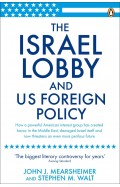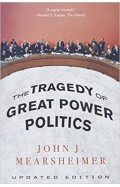How States Think - The Rationality of Foreign Policy
By: John J. Mearsheimer
-
Rs 6,115.50
- Rs 6,795.00
- 10%
You save Rs 679.50.
Due to constant currency fluctuation, prices are subject to change with or without notice.
To understand world politics, you need to understand how states think. Are states rational? Much of international relations theory assumes that they are. But many scholars believe that political leaders rarely act rationally. The issue is crucial for both the study and practice of international politics, for only if states are rational can scholars and policymakers understand and predict their behavior.
John J. Mearsheimer and Sebastian Rosato argue that rational decisions in international politics rest on credible theories about how the world works and emerge from deliberative decision‑making processes. Using these criteria, they conclude that most states are rational most of the time, even if they are not always successful. Mearsheimer and Rosato make the case for their position, examining whether past and present world leaders, including George W. Bush and Vladimir Putin, have acted rationally in the context of momentous historical events, including both world wars, the Cold War, and the post–Cold War era.
By examining this fundamental concept in a novel and comprehensive manner, Mearsheimer and Rosato show how leaders think, and how to make policy for dealing with other states.
To understand world politics, you need to understand how states think. Are states rational? Much of international relations theory assumes that they are. But many scholars believe that political leaders rarely act rationally. The issue is crucial for both the study and practice of international politics, for only if states are rational can scholars and policymakers understand and predict their behavior.
John J. Mearsheimer and Sebastian Rosato argue that rational decisions in international politics rest on credible theories about how the world works and emerge from deliberative decision‑making processes. Using these criteria, they conclude that most states are rational most of the time, even if they are not always successful. Mearsheimer and Rosato make the case for their position, examining whether past and present world leaders, including George W. Bush and Vladimir Putin, have acted rationally in the context of momentous historical events, including both world wars, the Cold War, and the post–Cold War era.
By examining this fundamental concept in a novel and comprehensive manner, Mearsheimer and Rosato show how leaders think, and how to make policy for dealing with other states.
The Israel Lobby And Us Foreign Policy
By: John J. Mearsheimer
Rs 2,965.50 Rs 3,295.00 Ex Tax :Rs 2,965.50
Our Oldest Enemy: A History of America's Disastrous Relationship With France Hardcover
By: John J. Mearsheimer
Rs 810.00 Rs 900.00 Ex Tax :Rs 810.00
The Tragedy of Great Power Politics
By: John J. Mearsheimer
Rs 7,105.50 Rs 7,895.00 Ex Tax :Rs 7,105.50
How States Think - The Rationality of Foreign Policy
By: John J. Mearsheimer
Rs 6,115.50 Rs 6,795.00 Ex Tax :Rs 6,115.50
Zubin Mehta: A Musical Journey (An Authorized Biography)
By: VOID - Bakhtiar K. Dadabhoy
Rs 892.50 Rs 1,050.00 Ex Tax :Rs 892.50
The Origins of Political Order From Prehuman Times to the French RevolutioN
By: Francis Fukuyama
Rs 4,045.50 Rs 4,495.00 Ex Tax :Rs 4,045.50
Manning Up: How the Rise of Women Has Turned Men into Boys
By: Kay Hymowitz
Rs 845.75 Rs 995.00 Ex Tax :Rs 845.75
The Obama Syndrome: Surrender At Home War Abroad
By: Tariq Ali
Rs 1,100.75 Rs 1,295.00 Ex Tax :Rs 1,100.75
The Quest For Meaning: Developing A Philosophy Of Pluralism
By: Tariq Ramadan
Rs 1,185.75 Rs 1,395.00 Ex Tax :Rs 1,185.75
No similar books from this author available at the moment.
Zubin Mehta: A Musical Journey (An Authorized Biography)
By: VOID - Bakhtiar K. Dadabhoy
Rs 892.50 Rs 1,050.00 Ex Tax :Rs 892.50
The Israel Lobby And Us Foreign Policy
By: John J. Mearsheimer
Rs 2,965.50 Rs 3,295.00 Ex Tax :Rs 2,965.50
Our Oldest Enemy: A History of America's Disastrous Relationship With France Hardcover
By: John J. Mearsheimer
Rs 810.00 Rs 900.00 Ex Tax :Rs 810.00
The Tragedy of Great Power Politics
By: John J. Mearsheimer
Rs 7,105.50 Rs 7,895.00 Ex Tax :Rs 7,105.50
How States Think - The Rationality of Foreign Policy
By: John J. Mearsheimer
Rs 6,115.50 Rs 6,795.00 Ex Tax :Rs 6,115.50

















-120x187.jpg?q6)





-120x187.jpg?q6)








